.jpg) Soundtrack 128 DDMA Ruby Soundtrack 128 DDMA Ruby
Introduced: July 1998
Interface: PCI
Audio codec: Crystal CX4237B
Wavetable: Dream SAM9407
Memory: 1 MB (expandable to 32 MB)
DAC: 24-bit Crystal
CD-ROM Interfaces: None
Price When New: 369 DM (with 4 MB expansion), 389 DM (with 16 MB expansion)
This PCI sound card from 1999 includes an onboard wavetable synthesizer with 1 MB of sample storage. You can expand this to a maximum of 32 MB via two 72-pin SIMM slots.
"The SoundTrack 128 DDMA PCI is the ideal sound card for semi-professional musicians, demanding gamers, and multimedia users who simply no longer have a free slot for a 'normal' ISA sound card in their PC. The most important performance features speak for themselves: 64-voice wavetable synthesizer/sampler with 4-32MB memory (a PS/2 SIMM) for custom instruments, effects processor (also usable externally) for programmable effects such as reverb, chorus, 3D-EQ, or surround, two analog line inputs, microphone input, two analog outputs (front + rear), MIDI interface, extended full duplex, game compatibility, and much more. Optionally, the ST128 DDMA PCI can be expanded with the Digital I/O Board to include digital input and output."
Core Specifications:
♦ Crystal CX4237B Codec (Mic, Line, CD, Phone & Aux Inputs 16Bit / 48kHz) for Windows Sound System and SoundBlaster Pro compatibility under Windows 95/98, Windows Sound System and SoundBlaster Pro compatibility under MS-DOS when using the Intel 430TX or 440BX chipset
♦ Dream SAM9407 DSP with updatable firmware, currently offering: Wavetable sample synthesizer with 4, 8, 16, or 32MB memory, hardware support for MOD files, up to 8 independent (virtual) wave devices, 4-band parametric EQ, up to 64-voice MIDI hardware polyphony on 32 channels, real-time DSP effects (3D/QSound, echo, chorus, reverb, pitch shifting, filter with cutoff/resonance)
♦ Hoontech K-128 PCI / PnP interface chip with support for DDMA on motherboards with Intel 440BX chipset (enables up to 5x higher transfer rates)
♦ Crystal CS4222 20-Bit AD/DA (for line-in input and front-out output)
♦ Crystal CS4327 20-Bit DA (for rear-out output)
♦ -90dB S/N
♦ Extended Full Duplex – recording and playback on multiple channels simultaneously / recording from all audio sources
♦ Support for bank files in DLS, 94B, and DMF formats, compatible with GM/GS, partially with XG
♦ Optional digital I/O board with optical/coaxial in, optical/coaxial out according to S/PDIF standard
♦ Game Port
♦ MPU 401 compatible MIDI interface
♦ Software included to control all mixer parameters and to create your own instruments
It will only provide Sound Blaster audio in DOS if your motherboard supports DDMA (Distributed DMA), e.g. Intel 430TX or Intel 440BX chipsets.
Hoontech sold an optional bracket that connected to the ST128 DDMA: SoundTrack Digital Bracket II / III - this provided optical and coaxial S/PDIF output. They also sold other brackets for existing Sound Blaster Live! owners in the form of the SB Live Digital I/O II (35 EUR or sold with the card with 549 DM, called "Soundtrack 128 DDMA PCI Pro"), which provided an additional digital output (equivalent to the rear analog output) and an additional optical connector for the digital front output. This way, both outputs of the SB Live! were available digitally. A SB Live Digital I/O III added some coaxial outputs too.
As with many more modern sound cards, the ST128 DDMA did not have any audio amplifier onboard, so powered speaker or an external audio amplifier were required.
Applications: Windows 95/98/ME
Drivers: Windows 95/98, Windows 98/ME (no DOS support), NT 4.0, Windows 2000
Other Downloads: Uninstall utility for Win9x
More Images
.jpg) .jpg) .jpg) .jpg) .jpg) .jpg) .jpg)
All images courtesy of DOS Days' contributor, targeted.
|
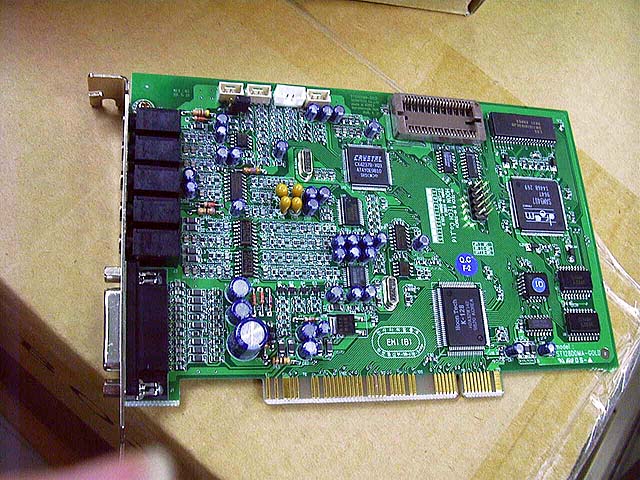 Soundtrack 128 DDMA Gold Soundtrack 128 DDMA Gold
Introduced: July 1998
Interface: PCI
Audio codec: Crystal CX4237B
Memory: 2 MB (expandable to 4 MB) DRAM
DAC: 18-bit Burr-Brown
CD-ROM Interfaces: None
Price When New: 199 DM
This PCI sound card from 1999 includes an onboard wavetable synthesizer with 2 MB of sample storage out of the box.
"The smaller version of the ST128 DDMA PCI (Ruby) is aimed at users who do not need a large amount of memory on their sound card but are not satisfied with a 'normal' PCI or ISA sound card. It has exactly the same features as the ST128 DDMA PCI, but only 2MB onboard. The memory can be upgraded to a maximum of 4MB with a special module – the card does not include a PS/2 SIMM socket. Additionally, the ST128 PCI Gold uses 18-bit DA/AD converters instead of the 20-bit DA/AD converters on the ST128 DDMA PCI."
The ST128 DDMA Gold uses 18-bit BurrBrown ADC/DAC chips, while the ST128 DDMA Ruby uses 20-bit Crystal chips.
Core Specifications:
♦ Crystal CX4237B Codec (Mic, Line, CD, Phone & Aux Inputs 16Bit / 48kHz) for Windows Sound System and SoundBlaster Pro compatibility under Windows 95/98, Windows Sound System and SoundBlaster Pro compatibility under MS-DOS when using the Intel 430TX or 440BX chipset
♦ Dream SAM9407 DSP with updatable firmware, currently offering: Wavetable sample synthesizer with 4, 8, 16, or 32MB memory, hardware support for MOD files, up to 8 independent (virtual) wave devices, 4-band parametric EQ, up to 64-voice MIDI hardware polyphony on 32 channels, real-time DSP effects (3D/QSound, echo, chorus, reverb, pitch shifting, filter with cutoff/resonance)
♦ Hoontech K-128 PCI / PnP interface chip with support for DDMA on motherboards with Intel 440BX chipset (enables up to 5x higher transfer rates)
♦ BurrBrown 18-Bit AD/DA (for line-in input and front-out output)
♦ BurrBrown 18-Bit DA (for rear-out output)
♦ -90dB S/N
♦ Extended Full Duplex – recording and playback on multiple channels simultaneously / recording from all audio sources
♦ Support for bank files in DLS, 94B, and DMF formats, compatible with GM/GS, partially with XG
♦ Optional digital I/O board with optical/coaxial in, optical/coaxial out according to S/PDIF standard
♦ Game Port
♦ MPU 401 compatible MIDI interface
♦ Software included to control all mixer parameters and to create your own instruments
It will only provide Sound Blaster audio in DOS if your motherboard supports DDMA (Distributed DMA), e.g. Intel 430TX or Intel 440BX chipsets.
Hoontech sold an optional bracket that connected to the ST128 DDMA: SoundTrack Digital Bracket II / III - this provided optical and coaxial S/PDIF output.
As with many more modern sound cards, the ST128 DDMA did not have any audio amplifier onboard, so powered speaker or an external audio amplifier were required.
Applications: Windows 95/98/ME
Drivers: Windows 95/98, Windows 98/ME (no DOS support), NT 4.0, Windows 2000
Other Downloads: Uninstall utility for Win9x |
.jpg) Soundtrack Digital 4DWave NX Soundtrack Digital 4DWave NX
Introduced: April 1999
Interface: PCI
Audio codec: Trident 4DWAVE-NX
DAC: (Unknown)
CD-ROM Interfaces: None
Price When New: 99 DM
"Based on the latest generation of Trident's 4DWave PCI audio chip, the SoundTrack Digital 4DWave NX sets new standards for modern PCI sound cards. The most important point upfront: for 99 DM (retail price), you get a game-compatible sound card with the connection option for four speakers and a digital output (optical and coaxial). Naturally, the SoundTrack Digital 4DWave NX also offers all the necessary functions one expects from a high-performance sound card. The card provides full hardware support for DirectSound and DirectMusic. In addition, the card is also compatible with A3D 1.0 and EAX for the best possible sound in computer games. Output is provided through either two or four speakers. Of course, the card also includes a game port for connecting a joystick via Microsoft's DirectInput interface. A signal-to-noise ratio of around 90dB was previously not standard in this price range.
Sensational is the coaxial and optical digital output, which can operate at 32, 44.1, and 48 kHz sample rates – ideal for all users who, for example, want to transfer MP3 files to MiniDisc. Optionally, the card can also be upgraded with a digital input (also optical and coaxial). The PCI card can be used not only under Windows 95/98, NT4, and Windows 2000, but also under DOS – thanks to the virtual DMA function, many DOS games can still be used with the SoundTrack Digital 4DWave NX. In addition, there is also a Linux driver for the sound card.
The GS-compatible wavetable section of the card uses DLS sounds. Therefore, if needed, the supplied 6 MB DLS bank can also be replaced with your own sounds. In addition, the card includes a full MIDI interface to which external devices can be connected. Thanks to the good DirectX driver, the card can also be used by musicians as an inexpensive output device (digital & analog) for software synthesizers."
At a glance:
♦ 18-bit AD/DA converters
♦ Full duplex
♦ DirectSound & DirectSound3D compatible (64 hardware channels)
♦ S/PDIF output (including AC-3 output) with 32, 44.1 & 48 kHz sample rate - optical and coaxial
♦ QSound, EAX, A3D 1.0
♦ DLS 1 / DirectMusic, GM & GS compatible
♦ Drivers available for Windows 95, 98, NT, MS-DOS & Linux
♦ Optional digital input upgradeable (S/PDIF optical & coaxial)
Drivers: Windows 95, Windows 98/ME, NT 4.0, Windows 2000
More Images
.jpg)
All images courtesy of DOS Days' contributor, targeted.
|
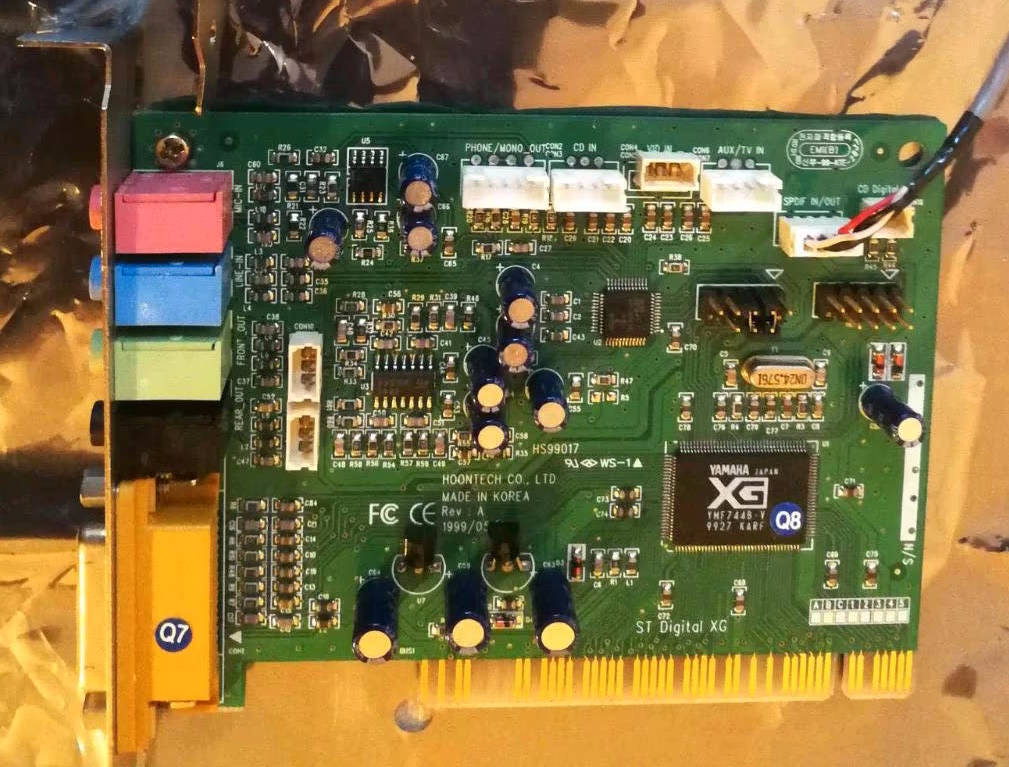 Soundtrack Digital XG Soundtrack Digital XG
Introduced: 1999
Interface: PCI
FM Synthesizer: Yamaha YMF744B
Audio codec: (Integrated into Yamaha chip)
DAC: (Integrated into Yamaha chip)
CD-ROM Interfaces: None
Price When New: 79 EUR
"The SoundTrack Digital XG is the ideal sound card for demanding Multimedia enthusiasts. Step into new dimensions of sound one. The Yamaha XG synthesizer on the card offers a absolutely perfect sound, as it would certainly hardly be heard from a other sound card. Also 3D sound (2 or 4 speakers) is no problem for the SoundTrack Digital XG.
But that's not all: the card is used together with a S/PDIF input and output (optical and coaxial). For example, you can use it digitally in the best possible quality Record with MD or DAT recorders. But also the Analog part offers extremely good audio values: with 18bit AD/DA converters you can also use the card for noise-free recording from analogue sources.
The SoundTrack Digital XG is the perfect solution for anyone who wants to who are looking for a card with really good MIDI sound - Game compatibility with perfect 3D sound included, of course. The Card compatible with all common standards.
By combining 4 line outputs and digital output the SoundTrack Digital XG is ideal for playing DVD movies. You can use all common Software players play signals separately via 4 speakers - or even better: if you have a hi-fi amplifier or special external decoder with digital input that allows the AC-3 / Dolby Digital Format, you can directly download the signal transmitted to the amplifier via the digital output. In combination with a good graphics card, you save a special DVD decoder card!
Please note the press reviews of SoundTrack Digital XG."
Specifications
| - |
Yamaha sound chip from the YMF7x4 Series |
| - |
SigmaTel STAC9708 18bit AC-97 Codec (AD/DA converter) |
| - |
96dB Output S/N Ratio (A-Weighted) |
| - |
stereo line input, microphone input, 4 internal inputs (CD, Video, Aux, Phone) |
| - |
Two stereo line outputs (Front & Rear), support for 4 speakers |
| - |
S/PDIF Digital Input (Toslink - optical, chinch - coaxial) - 32, 44.1 & 48kHz sample rates |
| - |
S/PDIF digital output (Toslink - optical, chinch - coaxial) - 48kHz sample rate |
| - |
AES/EBU input and output via Optional adapter cables can be used |
| - |
supports the output of AC-3 (Dolby Digital) signals |
| - |
Drivers for Windows 95/98/Me, Windows NT 4.0, Windows 2000/XP, Linux & BeOS available |
| - |
accelerated DirectSound Driver |
| - |
supports Sensaura 3D, EAX 1.0, A3D & DirectSound 3D |
| - |
Yamaha XG Synthesizer (100% XG compatible), also GS and GM compatible |
| - |
extended support for loadable Instruments in DLS format (supports DirectMusic) |
| - |
Sound Blaster compatible (Sound Blaster Pro, Sound Blaster 2.0) |
| - |
100% Full Duplex (simultaneous Recording and playback) |
| - |
MPU compatible MIDI interface (via separate MIDI/joystick adapter cable) |
| - |
DirectInput compatible gameport |
Something not mentioned in the Hoontech specifications is that the Yamaha YMF744B does support PC/PCI and DDMA (Distributed DMA) for legacy applications. This would likely still require a suitable DOS driver - if anyone has this card, please try running Unisound and test the card to see if it works in DOS.
More Images
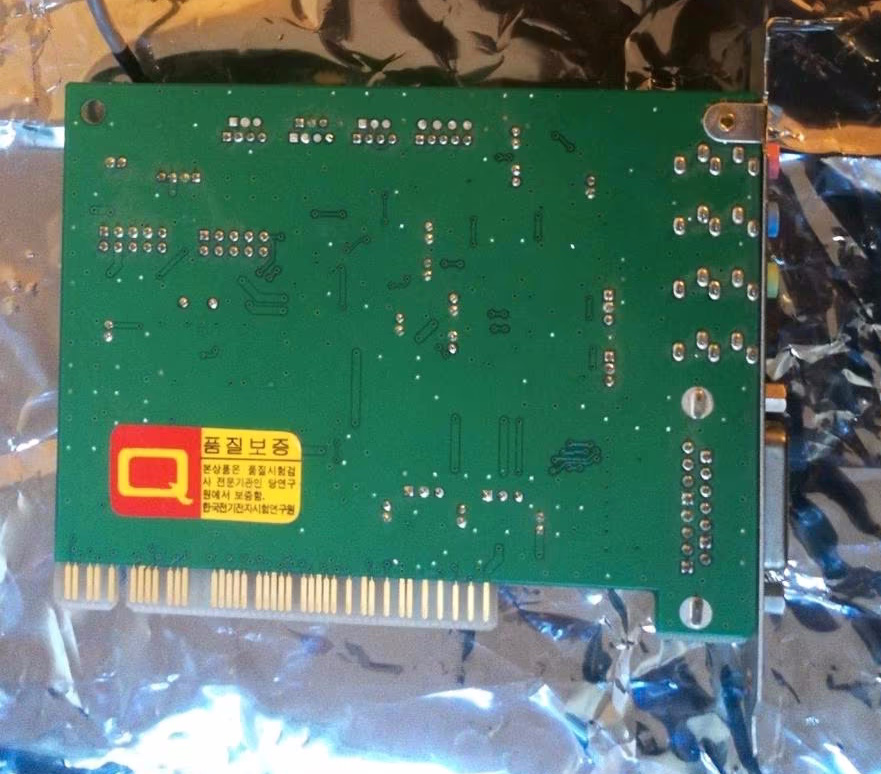 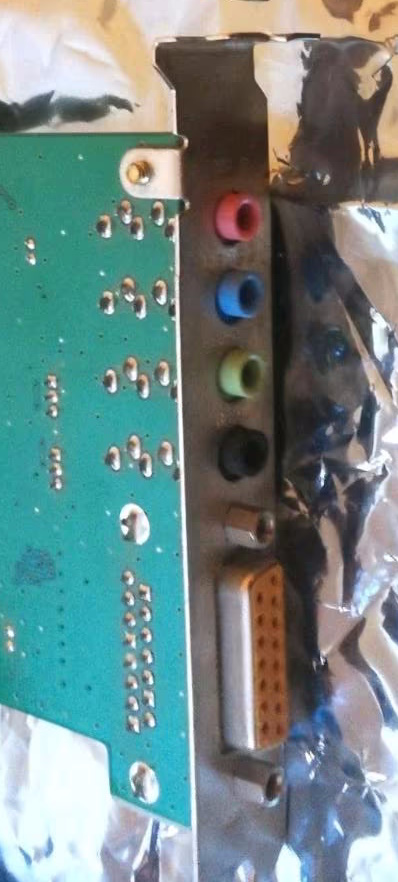 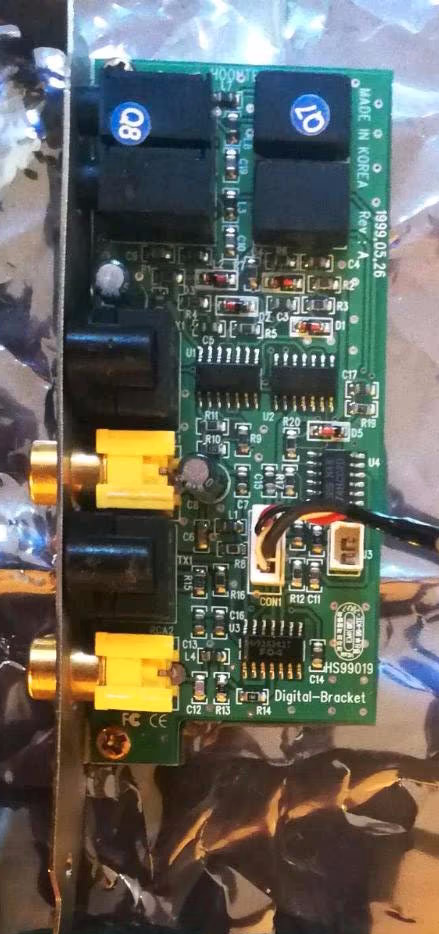 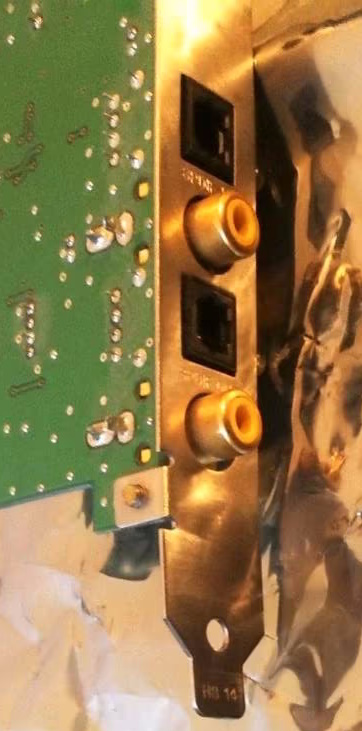
The first two images are of the card itself, followed by the optional S/PDIF/Coax bracket.
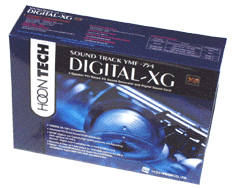
|
 Hoontech
Hoontech



.jpg)
.jpg)
.jpg)
.jpg)
.jpg)
.jpg)
.jpg)
.jpg)

.jpg)
.jpg)

